A Busy Summer
It was clear from the announced schedule for various sections of each class, that the summer of 1949 would be very busy for me.
I was entitled to 30 days leave, but I was going to try and 'tour Europe' part of which time would be with classmate Gorman. I would also be on the 'Beast Detail.' As new 1st Classmen, we would be responsible for training the new Plebes. i.e. 'run' Beast Barracks from July 1st on.
But first I had to pass all my 3d 'Cow' year academics.
So I slogged along, enduring the engineering classes and passing them, without facing any more 'turn out' exams. German was behind me.
I, and a handful of other Chess Club cadets had a break in the winter. We were invited to compete against Navy's Chess Club, on the New York's famed Chess Club. I wasn't on any winter sports athletic team, so this was a chance to get away from the Rock, if only for an overnight weekend.
We got to new York carried on a West Point bus, competed on Saturday afternoon, checked into our reserved hotel rooms and then Sunday morning. The New York Chess Club's playing rooms were what one expected. Not bright and airy like a modern auditorium, but reflecting the 18th century men's clubs drawing rooms, it was dark, low light, overstuffed chairs with floor lamps, inlaid wooden chessboard on carved leg tables. Just enough room for the two teams - I think there were six a side, and a handful of Club members, and pipe smoking onlookers. We wore our uncomfortable gray Dress Coats. The Swabbies were more comfortably dressed.
Brandon, our strongest player played the first Board, I was second Board, and Fidel Ramos was 3d.
It was all over by 2PM Sunday. We WON. We beat NAVY! I won my games and Fidel won his. Their strongest player beat Brandon.
When we got back, and from the big Dining Hall 'poop deck' where all 2,500 cadets eat at once, the results of our competition was announced, along with other weekend events, when it was announced West Point beat Navy in Chess, there was a big roar of applause. That tickled lots of cadet funny bones.
That was the only sports event I competed in against Navy that we won.
Hooha!
June week was hectic as usual, as the Class of '49 was feted, paraded, and graduated. It was then, when the travel schedule that Gorman would be on was known. His cadet group with Colonel Beukema, the 'other' permanent professor of Social Sciences accompanying, would go to Frankfurt, fly into divided Berlin on an Airlift plane, then end up in Rome. At which point Gorman and any other cadet with their entourage could 'drop off' in Rome and start their 30 days leave on their own. Those who didn't want to do that would fly back to the US with the tour group and take leave from West Point.
I saw that if I first headed for London, through Frankfurt, on my own, then rattle around London, taking pictures, and then head for Rome I could maximize my chances for linking up with Gorman. No guarantee.
So I headed for Westover Field starting my leave, with my orders in my hand in lieu of a Passport, as a US Military person going into occupied Germany and Italy.
When it was clear that they had lost my paper 'request', I contacted that Operations Colonel, who remembered me. Within one day I was on a military plane for Frankfurt, traveling light, with my fold up 35mm camera I had been using all along at West Point.
But I knew my cameras by then, and I knew that Germany was famous for its Leica's and Rolliflexes. I made a beeli\ne for the largest US Army Post Exchange and quickly bought a wonderful Rolliflex, with its larger negative size, and plenty of film. It was really cheap. I don't remember its exact cost, but it was at a post-war low, and cheaper still being sold from the Army PX. Now I had a real professional class camera.
Then I turned around and hitched a ride into London on a Berlin Airlift tired C-54 plane heading to be over-hauled before it came back to make the run again. The pilot let me take over the controls at one point so I 'flew' a ways getting the feel of the heavy controls needed to fly such a large four engine plane.
London
For several days, timing my effort to get to Rome in coordination with Paul Gorman's itinerary, I did the London Sights. And started taking great pictures with my new camera.
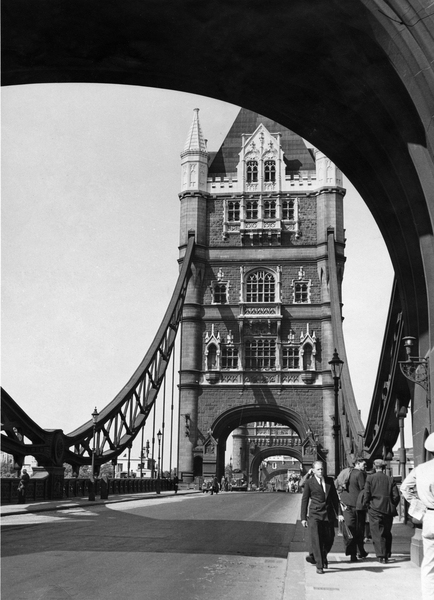
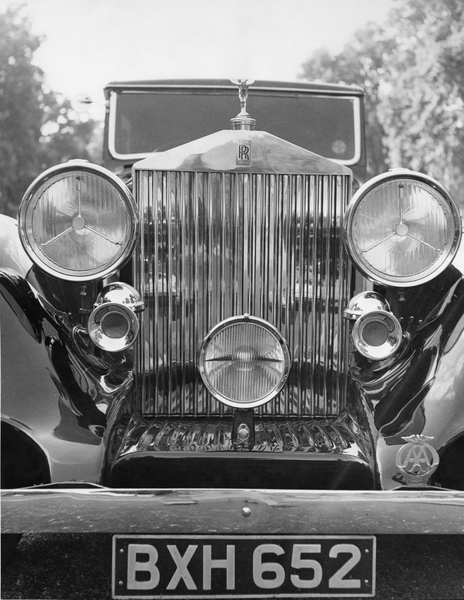
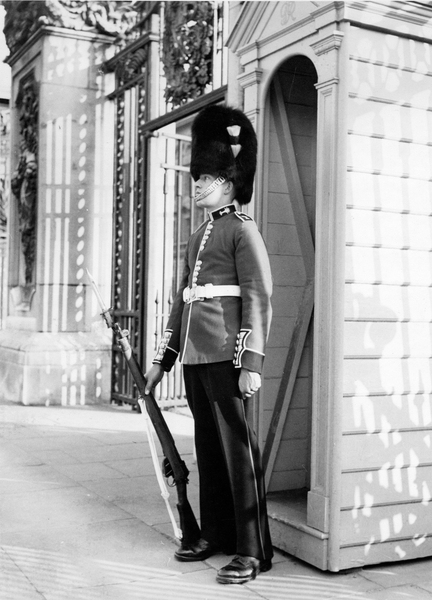
After enjoying the sights, Picadilly Square, browsing shops, and taking pictures - keenly aware that I was just a few hours drive away from Wales, where my ancestors had lived for centuries - I went back to the US Air Force operations office to hitch-hike to Rome. I had no time to sample Wales where I never had visited. Later.
As luck would have it, there was an Army Pay Plane I could take. It was carrying the dollar payroll for US Military in Italy, from Banks in London which had been a depository for US government funds for Europe.
Rome
So, I was off to Rome. When I got there I took a room with a telephone in a downtown large hotel. I had the name of the Hotel that the Class Tour was supposed to stay in after their group flew back from Tunis. I called there and left a message for Cadet Paul Gorman, and where I was.And crossed my fingers.
As luck would have it, he got the message, found he was only a few blocks from where I was staying. And within the blink of an eye, he took his leave from the Cadet Tour, starting HIS vacation leave along with mine, and he took a taxi to my hotel.
So we did Rome. And I got to photograph many of the great Roman ruins. There was little war damage done to downtown Rome.
In one shot, I got the Iconic Image of our tour, which was destined to become the front page of the Pointer Magazine when we got back. That is Cadet Paul Gorman walking through the Coliseum in the picture below.
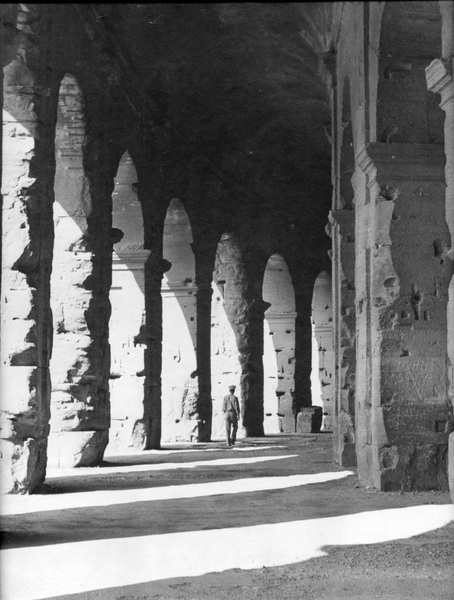
Then there were more, many more. Here are just a few.
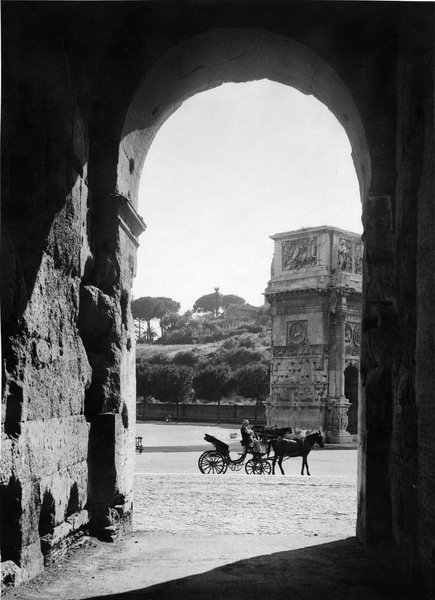
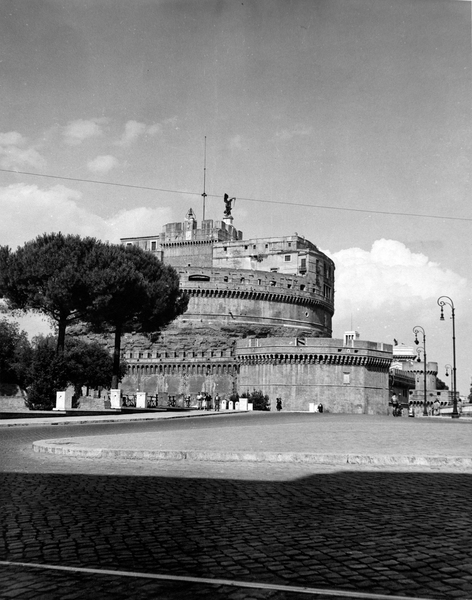
After a few more sights I photographed, and Gorman studied with our guide books, decided to go back to Germany, which would reveal much more the effects of war.
Post War Germany
We flew back to Frankfurt, Germany. There I started taking photographs of Germans who were living in bombed out buildings, and some of the destruction itself. Here are two typical scene.
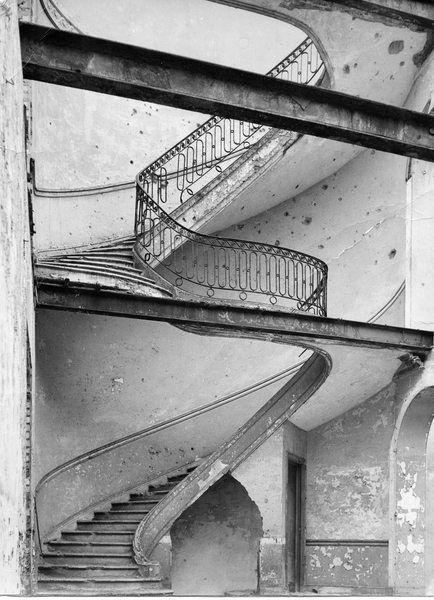
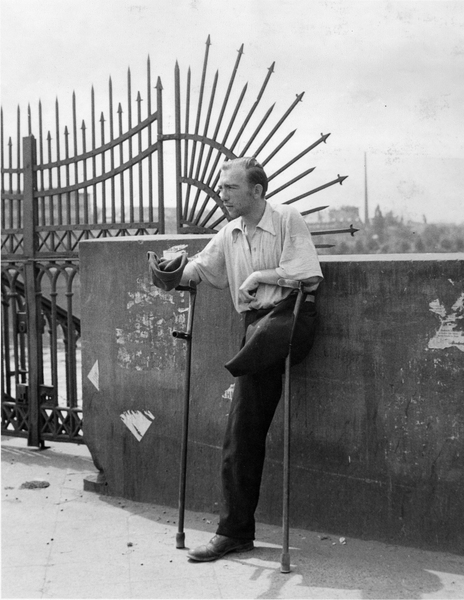
Suffice it to say, we saw the debris, both human and structural, of war.
(Those photographs will be contained in my Hughes Collection data base, and some will appear again as I relate the publishing we did with the Pointer Magazine when we got back.)
Gorman related to me an incident that happened when his group had a few hours off and they decided to sight see. They took a street car when it started to rain. The car had quite a few Germans in it. Gorman and his fellow cadet companion were wearing the black, rubberized, raincoats. They noticed that Germans began to talk and look at them. It dawned on the two cadets that their raincoats might have looked what SS troopers would have worn.
Nervous as to what might happen, they got off the streetcar and walked the rest of the way.
But what would be a Tour of Europe without a trip to Paris? So we hitched a military ride there too,
Paris
Is it any surprise, that we then encountered a whole gaggle of Cadets like us, who got to Paris on their own, and intended to sample its delights?
The word had spread at West Point, supported by a 'How To' article in the Pointer, how cadets could get a cheap trip to Europe on their vacation.
In fact 5 of us ran into each other - Gorman, I, three other cadets, and a Midshipman from Annapolis doing the same thing. All six of us took a large set of rooms off the Champs-Elysees, where for two days and nights we partied, slept, ate, and even entertained a few Parisian ladies. The 5 of we cadets looked, in our uniforms so similar, the French proprietress of the establishment was not sure she got paid for all of us. She did.
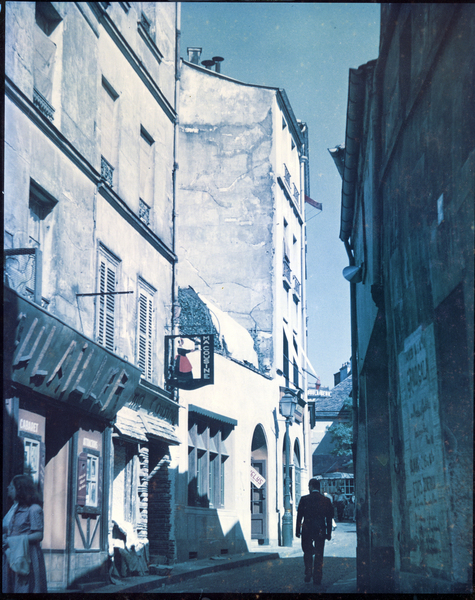
Yes, I even visited the bohemian Montmartre district where all the famed artists and writers hung out in the 1920s. I knew quite about the literary lights of Paris, some of whose writing styles I toyed with. And most of whose works I had read.
Then I found even a bistro named after the Famous 'Cadets de Gascogne' - the swashbuckling and romantic sons of gentry who fought as a Regiment for King Louis XIII and were favored by artists and playrights who featured them in Cyrano de Bergerac and the Three Musketeers.
No 'West Pointers' they, lots of romantic poetic nonsense has been written about them. So I put on my French Beret and had my picture taken as such a French cadet.
Ah yes, the Cadets of Gascogne!
Behold them, our Gascon defenders
Who win every woman they woo!
There’s never a dame but surrenders—
Behold them, our Gascon defenders!
Young wives who are clever pretenders—
Old husbands who house the cuckoo—
Behold them—our Gascon defenders
Who win every woman they woo!
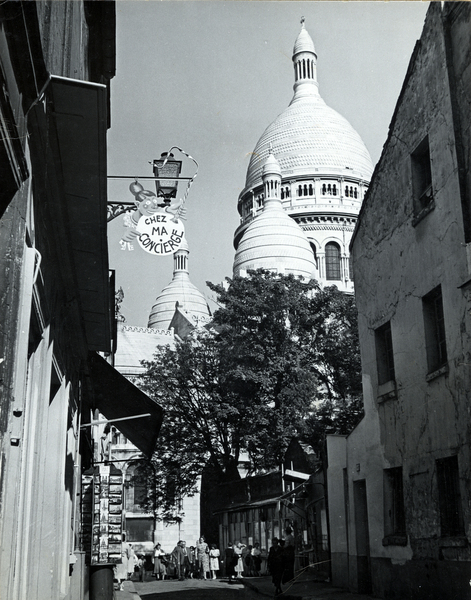
The Montmarte Church of the Sacre'-Coeuer
Then back to the US via Frankfurt - Rhein Main Airport - again. This time we traveled in a little more comfort than the bucket seats of a C-47 or the cavernous hold of a C-54. A USO troupe of actors were enroute back to the US also, so we got a ride in their passenger plane, courtesy of the US Airforce fleet.
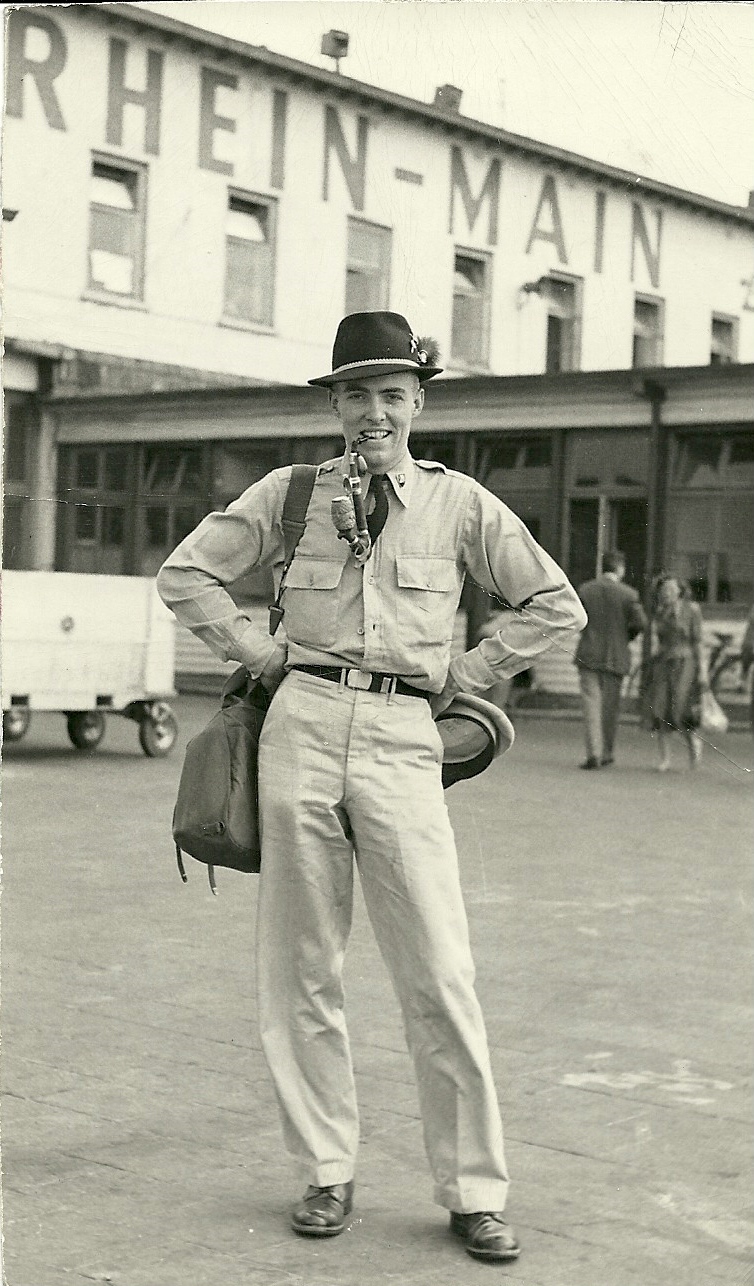
Next West Point (12)
